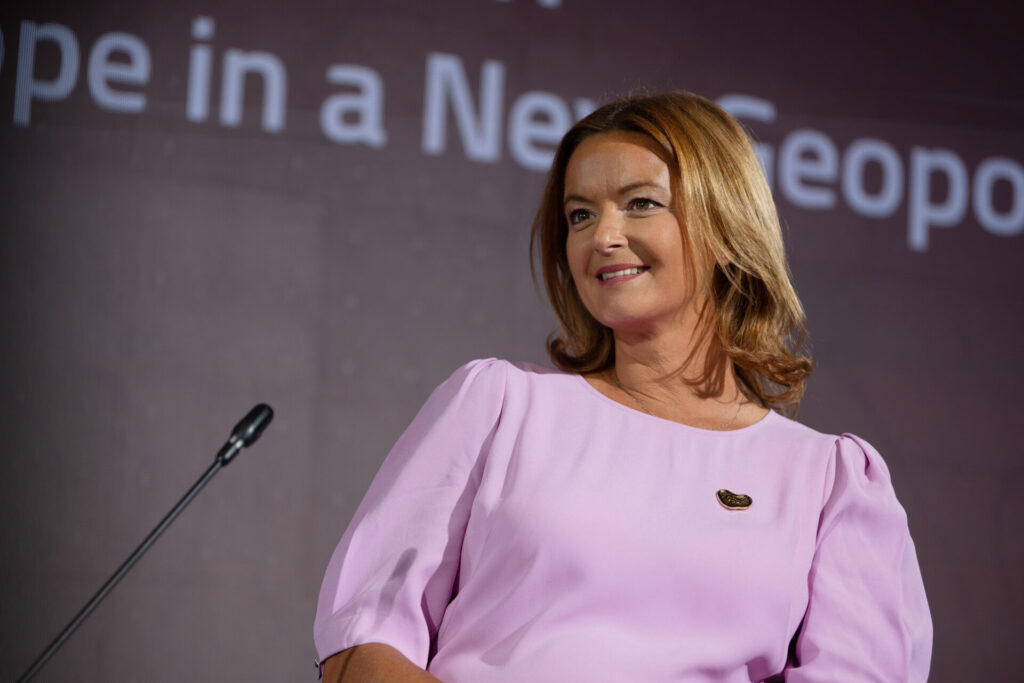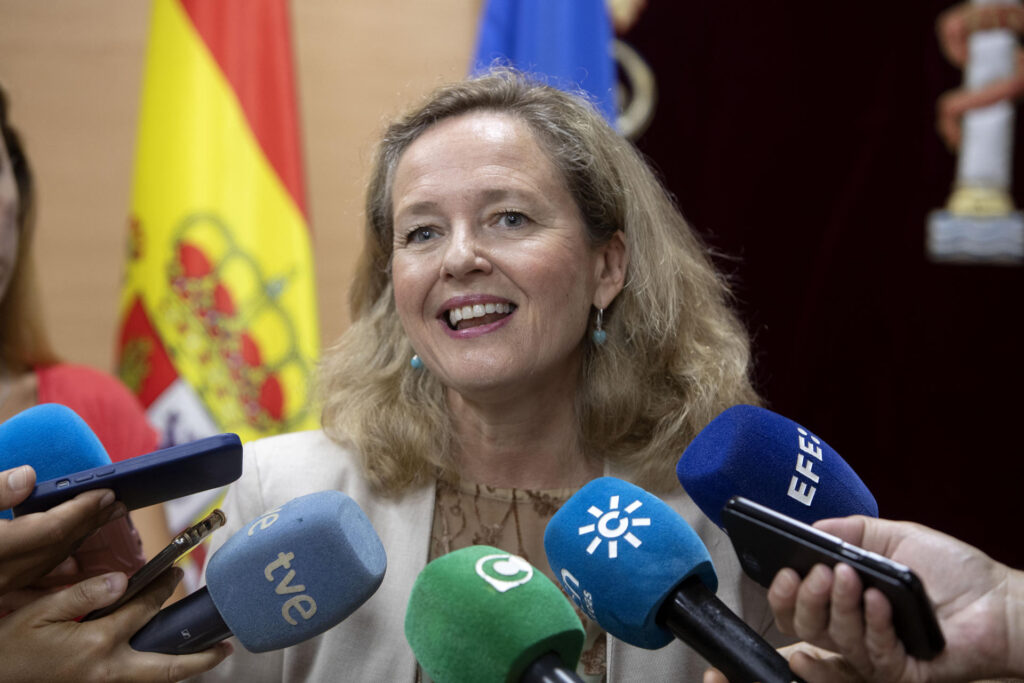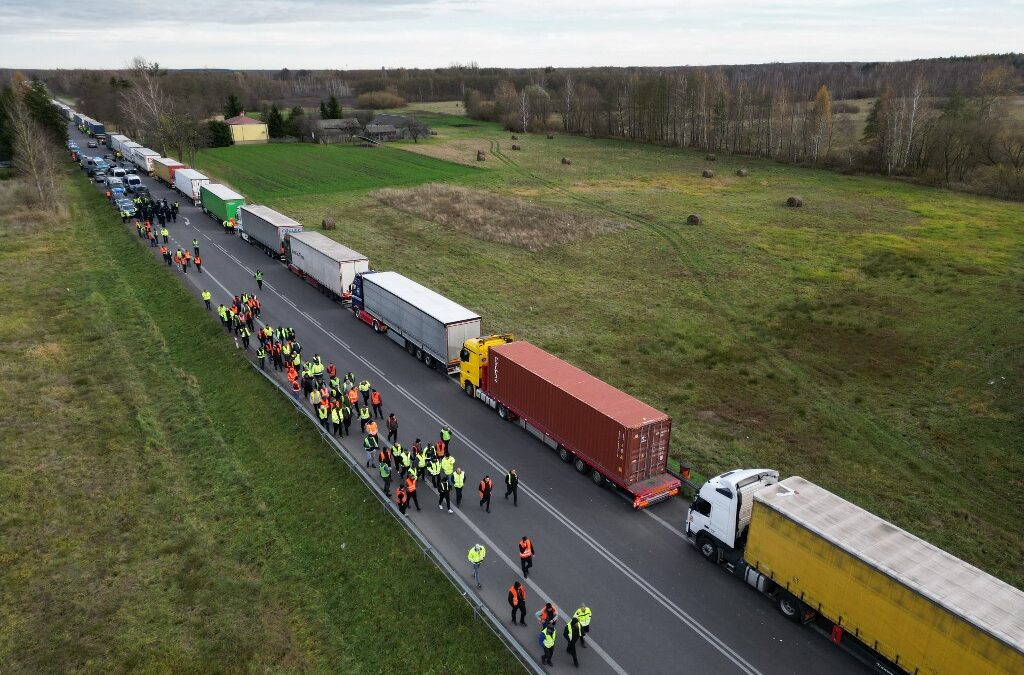 Have the article read by OpenAI (Beta). Please note that AI translations may take some time to process.
Have the article read by OpenAI (Beta). Please note that AI translations may take some time to process.Slovakian lorry drivers begin blocking a border crossing with Ukraine
Bratislava (AFP) – Joining a similar movement by their Polish colleagues, Slovakian road hauliers began blocking one of the border crossings with Ukraine on Friday to protest against competition from their Ukrainian counterparts.
The Slovak Road Hauliers’ Association (UNAS) began a blockade at the Vysne Nemecke crossing, allowing only four lorries through every hour.
“We are going to stay here until measures are taken to limit competition from Ukrainian hauliers,” Ratislav Curma, the president of UNAS, told AFP. “We want to support our Polish colleagues,” he added.
Polish hauliers are calling for the restoration of a permit system for Ukrainian trucks. This system was abandoned by the European Union and its member states in the wake of Russia’s invasion of Ukraine last year.
Kiev and Warsaw opened an extra lane on Monday for empty lorries coming from Ukraine and going to Poland, following an announcement of Ukrainian authorities on Sunday. They hoped that this decision would help to unblock the border, which has been paralysed by a protest movement of Polish lorry drivers. (3 December)

Lula says Mercosur and the European Union may end without a deal
Dubai (EFE) – Brazilian President Luiz Inácio Lula da Silva said on Sunday that the current negotiations for a trade agreement between Mercosur and the European Union (EU) could fail and that if they did, it would not be for lack of will on the part of the South American countries.
“If there is no agreement, be patient. It is not for lack of will,” Lula told a press conference in Dubai. “The only thing that has to be clear is that they can no longer say that it is Brazil’s or South America’s fault,” he added.
According to the Brazilian president, it is the rich countries that are responsible for the failure of the agreement, as they do not want to make any concessions and always want to gain more. In particular, Lula referred to France, whose president, Emmanuel Macron, said in a press conference on Saturday at the UN climate summit (COP28) that he opposed the agreement because it was “not good for anyone” and “obsolete”.
Mercosur will hold its bi-annual summit in Rio de Janeiro on 6-7 December and is expected to announce the positive conclusion of negotiations with the EU at that time. (3 December)

Slovenia’s Fajon urges North Macedonia to continue with reforms
Skopje (STA) – On meeting Deputy Prime Minister Bojan Marinchikj on Friday, Slovenian Foreign Minister Tanja Fajon reassured North Macedonia of Slovenia’s support for the country’s efforts to join the EU and called on all political stakeholders to focus on steps ahead.
The Macedonian press agency MIA reported that Fajon had underlined the necessity of constitutional changes and other measures for EU enlargement and accession talks. “Enlargement has become a geostrategic necessity, therefore I hope North Macedonia will show a lot of courage, confidence and hard work,” she was quoted as saying.
Marinchikj agreed with Fajon and stressed that constitutional changes were the only step that could bring his country closer to the EU. The European Commission had sent a strong message to North Macedonia in its annual progress report, saying that the country had to persist and step up its work along the course it had charted, said the deputy prime minister.
“We have made headway in 80 percent of the chapters and no backsliding has been seen in any of the chapters. This doesn’t mean that we’ve achieved everything, but it means that we have a good foundation to build on,” Marinchikj said according to MIA.
According to a press release from the Slovenian Foreign Ministry, Fajon promised that Slovenia would continue to help North Macedonia with experience and know-how in adapting to EU standards. Enlargement policy would ensure stability in the region, which was of significant importance in the current geopolitical situation, she said. The Foreign Minister also tweeted that she had thanked Marinchikj on Slovenia’s behalf for North Macedonia’s aid and solidarity after the country had been hit by devastating floods in early August.
Fajon and Marinchikj affirmed that relations between their countries were excellent and friendly, the press release added. They vowed to strengthen them further, also through a development cooperation partnership, for which they signed a memorandum entailing 2.1 million euros worth of projects in infrastructure, sustainable development and environmental protection. The ministry said in the press release that Slovenia had contributed over 43 million euros for development projects in North Macedonia since 2010. (1 December)

Battle between Calviño and Vestager for EIB presidency appears settled
Brussels (Belga) – More than ever, Spain’s Deputy Prime Minister and Minister of Economy Nadia Calviño, holds the pole position for becoming the new president of the European Investment Bank (EIB). Calviño and European Commissioner Margrethe Vestager have long been considered the favourites for the job, but now Belgian Finance Minister Vincent Van Peteghem, who is in charge of the appointment process, has sent a letter to his European colleagues explicitly asking them to support Calviño.
The EIB is looking for a new president, because its current chief, Werner Hoyer, is due to leave the “bank of the European Union” on 1 January 2024. The EIB is the world’s largest multilateral financial institution; the 27 EU countries are the bank’s shareholders.
Calviño, who only joined Spanish Prime Minister Pedro Sanchez’s new government in November, but was a minister before that, has been vying for the EIB presidency for some time. She is up against Vestager and candidates from Italy, Poland and Sweden. However, Vestager’s candidacy was damaged in the summer, when she appointed an American economist, Fiona Scott Morton, as Chief Economist at the European Commission’s Directorate-General for Competition. This appointment caused a storm of protest, particularly in France. Scott Morton then decided to withdraw.
However, Vestager has not been ruled out as a candidate for the EIB presidency. Since France, Germany and Italy are the bank’s biggest shareholders – and Paris and Berlin have no compatriots in the running – everyone has been looking at her. But for a long time, the French and Germans kept their cards close to their chests, until German Chancellor Olaf Scholz recently said openly that his government was backing Calviño.
Now it seems that France has also thrown its weight behind Calviño. On Friday, Minister Van Peteghem’s spokeswoman confirmed a report by the news site Politico that he had sent a letter to his colleagues in the European Ecofin Council, asking them whether they could support the Spaniard’s nomination rather than Vestager’s.
The issue will be discussed on Friday, 8 December. That is when the 27 European finance ministers will meet in Brussels for their monthly consultations and it should be clear whether Calviño has the support she needs. The choice of Werner Hoyer’s successor(s) must be backed by at least 18 member states, which together contribute more than 68 percent of the EIB’s capital. (1 December)
This is a compilation of the European coverage of enr news agencies. It is published Tuesdays and Fridays. The content is an editorial selection based on news by the respective agency.
